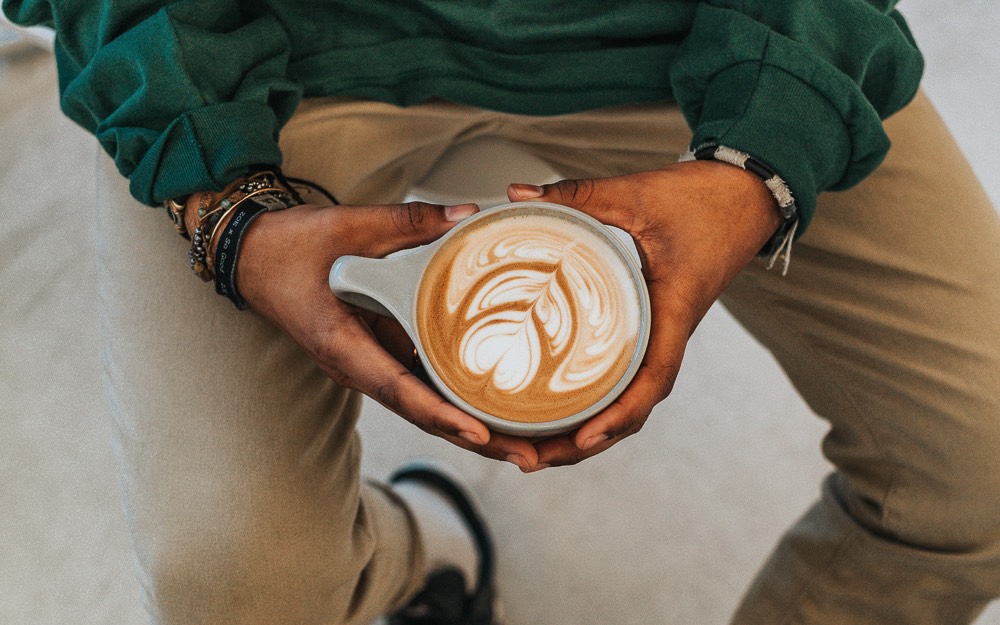Why does drinking too much coffee cause caffeine “jitters”?

It’s an all too familiar experience for those of us who have drank too much coffee: shaky hands, a rapid heart rate, and an underlying sense of anxiety. These side effects are often the result of consuming high levels of caffeine – hence the term caffeine “jitters”.
For many industry professionals (and even consumers), drinking and tasting coffee is part of their daily routines, making it somewhat unavoidable. However, many people also want to regulate their caffeine consumption – especially those who are particularly sensitive to this stimulant.
So how does caffeine cause these physiological reactions? And are there ways to mitigate the effects of consuming too much of it? To find out, I spoke to Dr. Samo Smrke of the Zurich University of Applied Sciences and Dr. Angela Zivkovic of University of California, Davis. Read on for more of their insight into why drinking too much coffee can cause caffeine “jitters”.
You may also like our article on whether drinking too much coffee causes stomach problems.
What are the effects of caffeine on the body?
Caffeine is a natural stimulant you can find in a number of food products. These include coffee, tea, cocoa, guarana, and yerba maté. Although consumption of caffeine is known to improve several cognitive and physical functions, many people choose to limit their intake for numerous reasons.
According to the US Food and Drug Administration, caffeine can be part of a healthy diet for most people, but consuming too much of it may be harmful to some. This ultimately depends on a wide range of factors, which include:
Weight
Pregnancy
Taking certain medications
Individual sensitivities or allergies to caffeine
For adults who are considered to be in good health, the FDA states 400mg caffeine per day is a safe amount. This roughly equates to between four and five cups of coffee.
However, the average amount of caffeine in coffee drinks can somewhat vary. For instance, a 2023 study from consumer group Which? found there are “huge differences” in caffeine content in major UK coffee chains’ drinks. This was related to the number of espresso shots in the drink, as well as the amount of robusta.
Why do people consume caffeine?
Dr. Samo Smrke is the head of the ZHAW School of Life Sciences and Facility Management Section for Coffee Competence Centre and Analytical Technologies.
“As a molecule, caffeine is both water and lipid soluble. This means it’s absorbed by different systems in our bodies,” he says. “Studies have found there are complex interactive mechanisms and metabolic pathways for caffeine in the body.”
When consumed in moderation, he says that caffeine can improve alertness, attention, and physical performance. Samo explains this is because caffeine initiates the release of dopamine in the brain. Dopamine is a neurotransmitter that can boost mood and motivation.
He adds that over time, caffeine can also increase metabolic rate (and thereby support weight loss), boost long-term memory, and help with liver detoxification.
There is also evidence to suggest that safe levels of caffeine consumption can lower the risk of developing certain diseases. These include Type 2 diabetes, strokes, and liver and cardiovascular diseases, as well as Alzheimer’s and Parkinson’s disease. However, this is largely dependent on both age and biological sex. Moreover, further clinical research is necessary to better support these claims.
Dr. Angela Zivkovic is an associate professor at the Department of Nutrition at UC Davis, as well as a faculty member of the UC Davis Coffee Center.
She explains that caffeine molecules travel through different mechanisms in the body. For instance, the compounds which result in increased alertness are processed through one biochemical pathway. The compounds which lead to a higher level of anxiety, meanwhile, are processed differently.
Angela adds that coffee also contains other compounds which have supposed health benefits, such as antioxidants like polyphenols – but further research is needed again.
Looking at the negative effects
Even when consuming the recommended daily dose of caffeine, Samo explains you can still experience negative side effects.
For instance, caffeine intake can temporarily increase heart rate, blood pressure, and the release of acid in the stomach (which can sometimes cause acid reflux). Samo adds that for some people, even a small amount of caffeine can reduce control of their motor skills, trigger headaches or dizziness, and lead to insomnia, as well as worsening irritability, anxiety, or depression.
As caffeine is a drug, higher levels of consumption over a prolonged period of time can result in increased physical and psychological dependence, too.
However, it’s important to note that these side effects are largely related to consuming more than the recommended daily amount of caffeine on a regular basis.
In this case, Samo explains that excessive intake of caffeine – or a “caffeine overdose” – can have harmful effects on multiple systems in the body. He says that high rates of caffeine absorption in the central nervous system can lead to confusion, delirium, intense headaches, and insomnia. Some people may even experience flashes of light, ringing noises, or feel increased sensitivity to touch or pain.
The effects on the cardiovascular system can include rapid or irregular heartbeat, while the muscular system can experience spasms, sporadic movements, and muscle overextension. Effects on the gastric system, meanwhile, can include abdominal pain, nausea, and vomiting.
Ultimately, every individual will experience these negative side effects, including caffeine “jitters”, differently. Certain factors such as age and biological sex also play a key role.
So what are caffeine “jitters”?
If someone is jittery, it generally means they feel nervous and unable to relax. In some cases, drinking too much coffee can result in similar symptoms.
Angela explains the jittery effects of caffeine are the result of methylxanthine – a naturally occurring substance in food. Caffeine is the main methylxanthine of coffee, and it has stimulating effects on our central nervous systems.
Essentially, methylxanthine binds to adenosine receptors. Adenosine is an organic compound found in human cells which helps to dictate our energy levels.
As our levels of adenosine build up throughout the day (meaning we have less energy and feel more tired), more adenosine binds to its receptors. When we drink coffee, methylxanthine also binds to these receptors, and thereby blocks adenosine from doing the same. This is why caffeine can make us feel more alert no matter the time of day.
However, Angela says once our bodies metabolise and remove caffeine, built up adenosine can then bind to the receptors. This causes a sudden onset of tiredness, or “caffeine crash”, which can disrupt the circadian clock and lead to irregular sleep patterns. In the worst cases, this can even cause insomnia.
Fight or flight response
When looking specifically at experiencing caffeine “jitters”, Angela tells me that caffeine consumption can increase the level of cortisol in the body. This can result in more stress-related behaviours.
“You can start to get sweaty, your heart beats faster, and you have this jittery sensation because your body has received a signal that there is some kind of danger nearby,” she says.
As well as these symptoms, the arteries will constrict, too. This forces blood away from the central organs to the extremities of the body (such as arms and legs) – essentially a “fight or flight” response. There may also be an increase in blood pressure in the head, which can lead to recurring headaches and eyesight problems.
Angela adds that the physical “fight or flight” response caused by caffeine can also result in experiencing more mental stress and discomfort.
Do people experience these symptoms differently?
Given that people’s caffeine thresholds can vary greatly, there will be some differences in how they experience its effects.
“There are genetic differences between different people, [including the enzymes which break down caffeine],” Angela explains. For example, in the liver, cytochrome P450 enzymes are the first enzymes to convert caffeine into other substances.
“The activity of these cytochrome P450 enzymes can vary widely between different people,” she adds. In essence, this means that some people will metabolise coffee more slowly than others.
“For people who metabolise caffeine more slowly, drinking more than two cups of coffee per day is associated with a higher risk of heart attacks,” Angela says. “However, it’s a lot more complicated than this because cytochrome P450 enzymes also break down many other substances.”
She explains that the activity of cytochrome P450 enzymes is majorly impacted by a person’s diet and environment. Moreover, a person’s weight and body type will also influence the rate at which caffeine is metabolised, as well as the amount of food they have eaten prior to drinking coffee.
“The duration of how long caffeine stays in the system, as well as how strongly it affects someone, varies so much that it’s difficult to conclude the amount of caffeine that can make someone feel jittery,” Angela tells me.
Around 30 to 60 minutes after consumption, caffeine reaches its peak level in the bloodstream.
“The average time it takes to metabolise around half of the caffeine in the body is about five hours,” Samo says. “However, the time can vary between 1.5 to 9.5 hours depending on the individual.”
How can you mitigate the negative effects of caffeine?
By far the easiest way to avoid the negative symptoms of caffeine is to consume moderate amounts of coffee.
“Continuous consumption of caffeine over the recommended daily limit can cause serious health problems,” Samo explains.
He adds that drinking more arabica can help to reduce caffeine consumption. This is because it contains around half the caffeine content of robusta.
Although it’s important to note that the amount of caffeine per serving will vary depending on the dose, Samo estimates that 1g arabica contains around 10mg caffeine, with 1g robusta therefore containing 20mg caffeine. He adds that this could mean caffeine levels can range from “70mg for a traditional Italian espresso using arabica to 400mg for a double shot of fine robusta”.
Moreover, decaffeinated coffee is also an option. Decaf coffee usually contains between 2mg and 15mg caffeine per 8oz serving. Naturally low-caf varieties such as Laurina and Aramosa are also becoming more popular.
Food & water
It is also recommended to avoid drinking coffee on an empty stomach. This helps to slow down the absorption of caffeine, as well as reducing the chance of experiencing acid reflux.
Although some claim that eating certain foods (notably bananas) can help to prevent caffeine “jitters”, there is little scientific evidence to substantiate these claims. If you do consume too much caffeine, the best solution is drink plenty of water and refrain from any physical activity for a few hours to allow your nervous system to calm down.
“Many people enjoy drinking coffee, and it has a number of benefits for them,” Angela says. “Studies report different effects for different demographics of people, but what works best for you is most important.”
In summary, regularly consuming caffeine above the recommended daily limit can certainly result in negative side effects. However, although it can vary from person to person, moderate consumption of coffee is not likely to cause caffeine “jitters” or similar issues.
Ultimately, by taking a more mindful approach to when and how often you drink coffee, you can reduce the likelihood of any potential problems.
Enjoyed this? Then read our article on coffee, health, and wellness.
Perfect Daily Grind
Disclaimer: we are not a medical publication. No material in this article is intended to be a substitute for professional medical advice, diagnosis, or treatment. Always seek medical advice from a qualified healthcare professional.
Want to read more articles like this? Sign up for our newsletter!
The post Why does drinking too much coffee cause caffeine “jitters”? appeared first on Perfect Daily Grind.




Responses